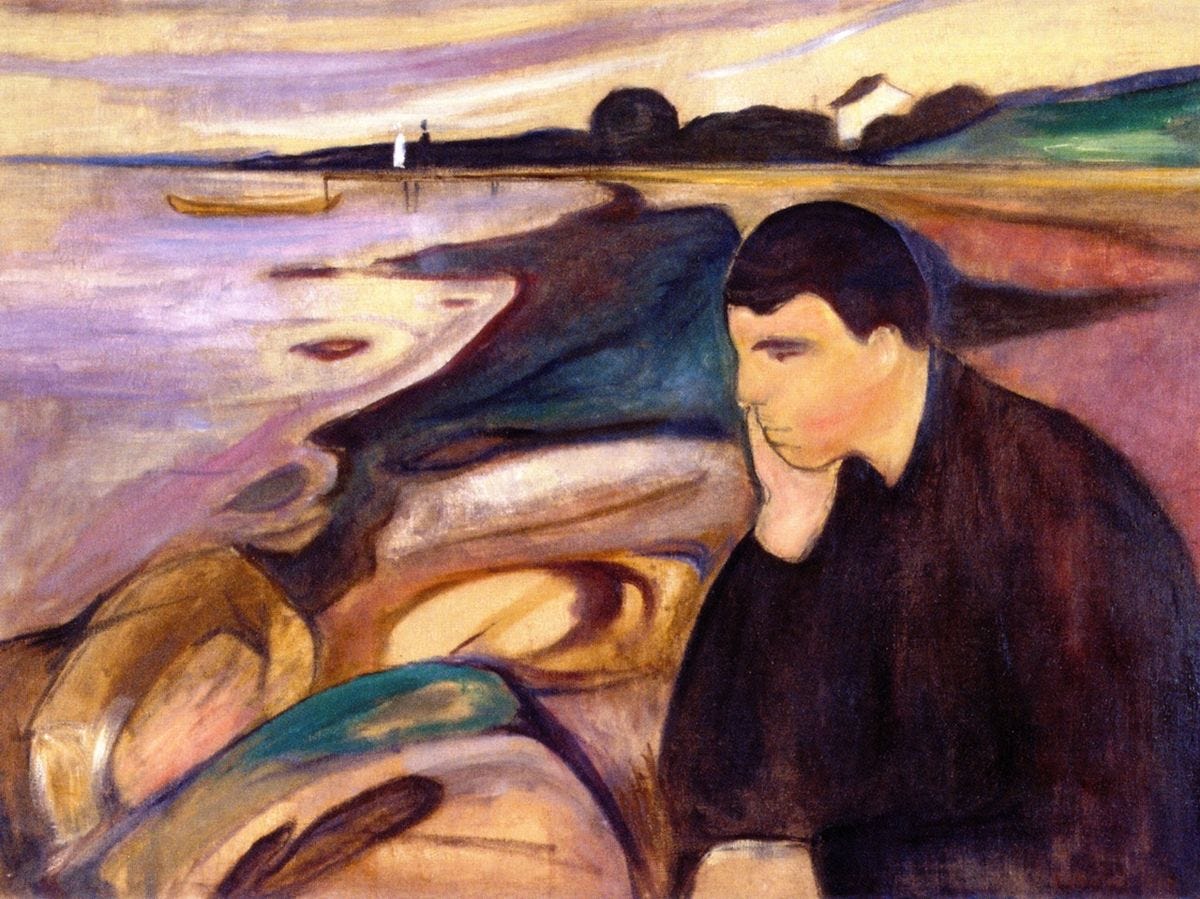Port Medway, Nova Scotia, July 28, 2024
Melancholy
My friend Jim asked me, shortly after my eightieth birthday, “How do you feel?”
I was tempted to repeat what an aged comrade replied when I asked him the same question a while back: “Never ask a man over eighty how he’s feeling.”
What I did say to my friend Jim was, “I am full of sadness. Sometimes I start to weep for no reason.”
Jim stared at me. Then he said: “Why are you sad? Why would you weep for no reason? You have had a golden life, in a golden age. You are among the most fortunate of people. Just about anyone would trade places with you.”
“That’s not true,” I said. “Who would trade places with an octogenarian? Only a nonagenarian. Who would trade places with someone whose remaining life is likely short and dodgy, and whose achievements are in the past? Who would trade places with someone who has health problems looming and whose closest friends are dying off? I’ve been to two funerals in the last two months. And I can’t remember the names of people I’ve known for most of my life.”
Jim said, affectionately (I think), “You’re being foolish and self-indulgent and self-pitying. It doesn’t become you. Let’s talk about something else.”
Some people have a predisposition towards melancholy. Modern medicine asserts that melancholy is a form of clinical depression. It is marked, so the doctors say, by loss of interest in activities that are normally enjoyable and by lack of emotional response to pleasurable situations. This kind of cold clinical analysis is not what I am talking about (“That is not what I meant, at all…”). In his 1621 book Anatomy of Melancholia (reprinted as recently as 2001) Robert Burton wrote, with his customary literary flair, that melancholy, for those who suffer from it, “goes and comes upon every small occasion of sorrow, need, sickness, trouble, fear, grief, passion, or perturbation of the mind, any manner of care, discontent, or thought, which causes anguish, dulness, heaviness and vexation of spirit… And from these melancholy dispositions no man living is free…” Melancholy as described by Burton is not a loss of interest in enjoyable activities or lack of emotional response to pleasurable situations. It is not a clinical condition. It is an appropriate emotional reaction to the world we live in, a world sometimes noticeably short on enjoyable activities and pleasurable situations.
My favourite aunt once told me that the men in our family have a genetic tendency towards depression—a “weakness,” she called it. (As Jews of East European descent, perhaps we’re entitled to a depressive streak. I’ve known others, not family members, but of similar ancestry, who’ve been similarly afflicted.) When I was a boy, my father came into my bedroom early one morning before he went to work, sat on the bed looking unhappy, and said, “I wish I could be more cheerful.” That happened about 70 years ago, but I remember it vividly, a compelling and poignant memory of my late father who, I believe, was unhappy most of his life for no particular reason. The Greek philosopher Heraclitus said that character is destiny. I say that temperament, your emotional constitution, innate or developed, biologically or genetically based or not, is equally important when it comes to your destiny. Some people are born with a tendency to be sad. They wait for a reason to be melancholic, and they will always find one. It’s in their nature.
Melancholy, although an emotional state, is rational. Much of the world is roiled by destructive crises that seem to have no end. If you’re old, your personal future is limited and problematic. Sometimes, Robert Burton’s “anguish, dulness, heaviness and vexation of spirit” is a true and honest response to the world around you and your personal circumstances. “From these melancholy dispositions no man living is free…” This is true even if, like me, you’ve had a golden life, in a golden age.
A few reader comments on Newsletter #73, “Emulate the Buddha”:
One reader wrote: “All things in moderation . . . including moderation. There are times for excess.”
Another reader made the same point: “The instalment brought to mind some advice my paternal grandfather passed along... He too was chased out of Eastern Europe. ‘Everything in moderation including excess.’ I assumed my grandfather did not come up with this on his own so I did a quick Google search… and the possible origins remain unclear though an Oscar Wilde quote did come up: ‘Everything in moderation including moderation.’”
A faithful correspondent told this story: “I love that your maternal grandfather said 'everything in moderation' as I also have that phrase in my lexicon coming from one of my maternal grandparents. I can't remember which one. They were each born in Canada in the late 1800's and their parents came from Scotland and Ireland in the early part of that century from reasonably comfortable circumstances. The phrase, it seems, travels through cultures and life settings.”
A reader commented: “When my kids were teenagers and presented me with one of their life issues, they would always roll their eyes when my answer inevitably included some reference to ‘balance’. It became known in our household as ‘the B word’. It’s a principle I still try to follow, with varying degrees of success.”
An interesting comment: “Aristotle's advice of temperance in most matters is sensible. Mortimer Adler—the reader of Aristotle and perhaps most famous for writing How to Read a Book—drew a distinction between the ‘limited goods’ of liberty and equality and the ‘unlimited’ good of justice. There is a such thing as too much liberty and too much equality—we can have more than is good for us. But there's no such thing as too much justice. We should have as much liberty and as much equality as justice allows.”
A regular reader made this observation: “[T]here's Barry Goldwater's ‘moderation in the pursuit of justice is no virtue...’ But probably even he… would probably have admitted that some balance between means and ends is required, both to achieve anything and just to get by. I suspect that your friend Julian, in his perceptive comment on you as a flaneur, meant 'coiffed' rather than 'quaffed'…” (Several readers thought that Julian, my severest critic, must have mean ‘coiffed’ rather than ‘quaffed’ although others thought that ‘quaffed’ was clever and was what he really meant.)
From a Nova Scotia reader: “In Quan Barry's Buddhism-based novel, When I'm Gone, Look for Me in the East, there is a line about self-reliance that reads: ‘When the only hope is a boat and there is no boat, I will be the boat.’ This sounds a little more inspirational than: ‘When the only hope is a boat and there is no boat, I will ask the neighbour's kid for help.’”
Finally, a reader, who shall remain anonymous but might be Canada’s Ambassador to the United Nations, gave this advice: “Don’t forget Hillel’s 3 Questions!” (Rabbi Hillel’s three questions are: “If I am not for myself, who will be for me? If I am only for myself, what am I? And if not now, when?”)
Note to readers: There won’t be an Endgame next Sunday. This coming week I will be sampling the fleshpots of Halifax. Regular service will resume on Sunday, August 10.






Edvard Munch, Edward Hopper
As so often happens Philip you write about a topic that is on my mind .
As I see it health events, aging realities and the profound ache of losing friends who were kindred spirits presents us with a challenge.
The challenge of finding joy even though sadness is increasingly weaving its way into our emotional quilt. And just as importantly accepting that some days we will not meet that challenge.